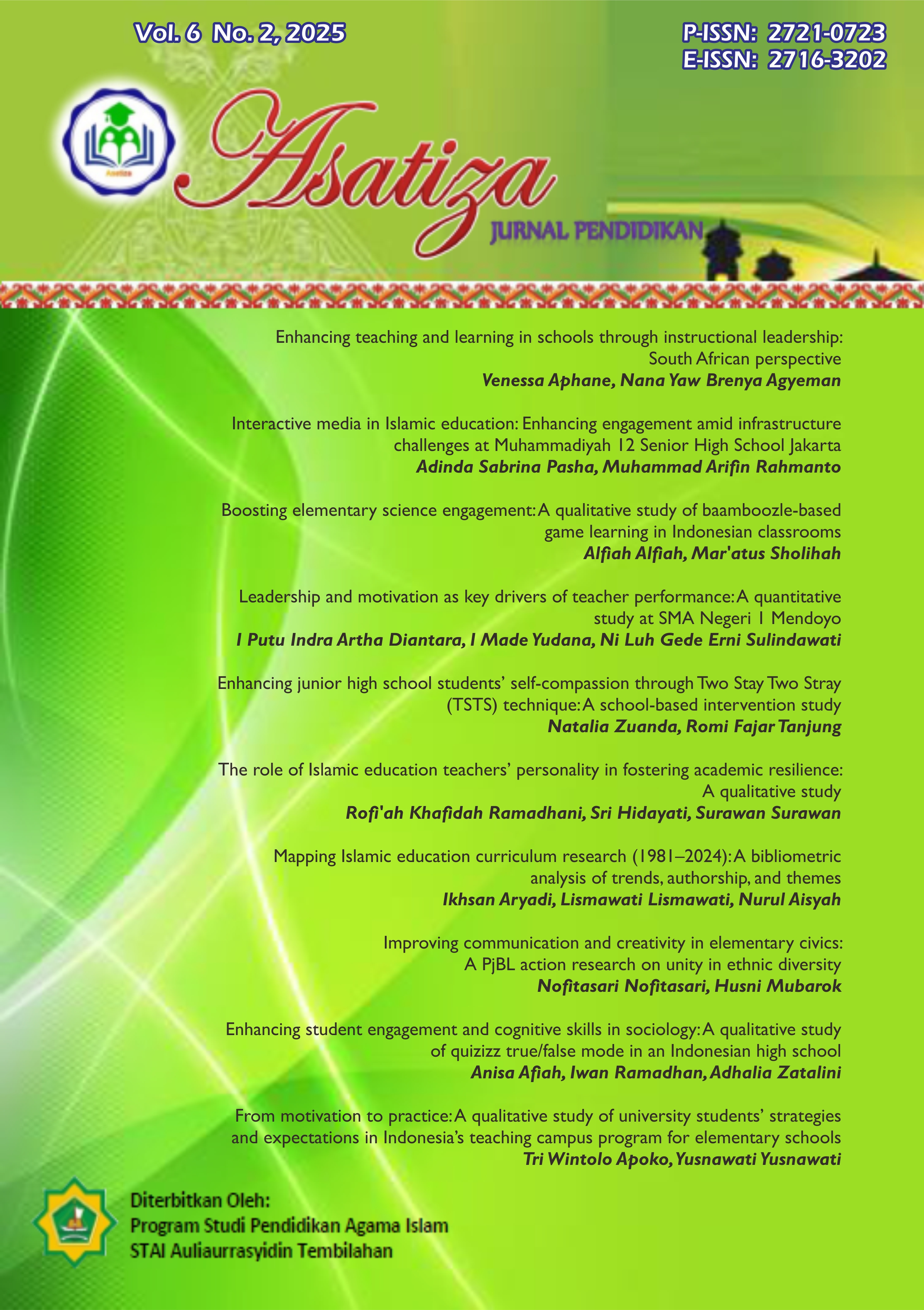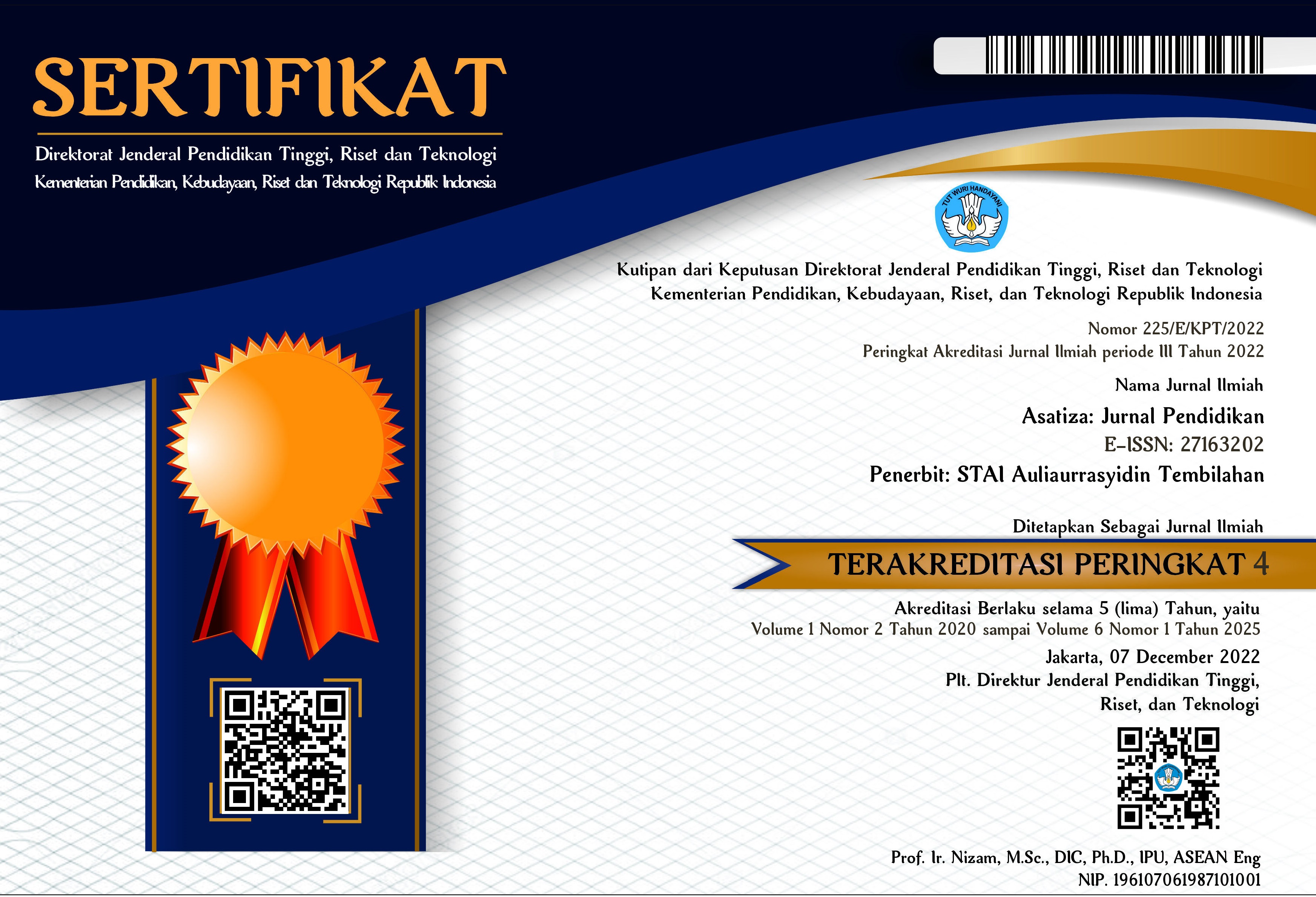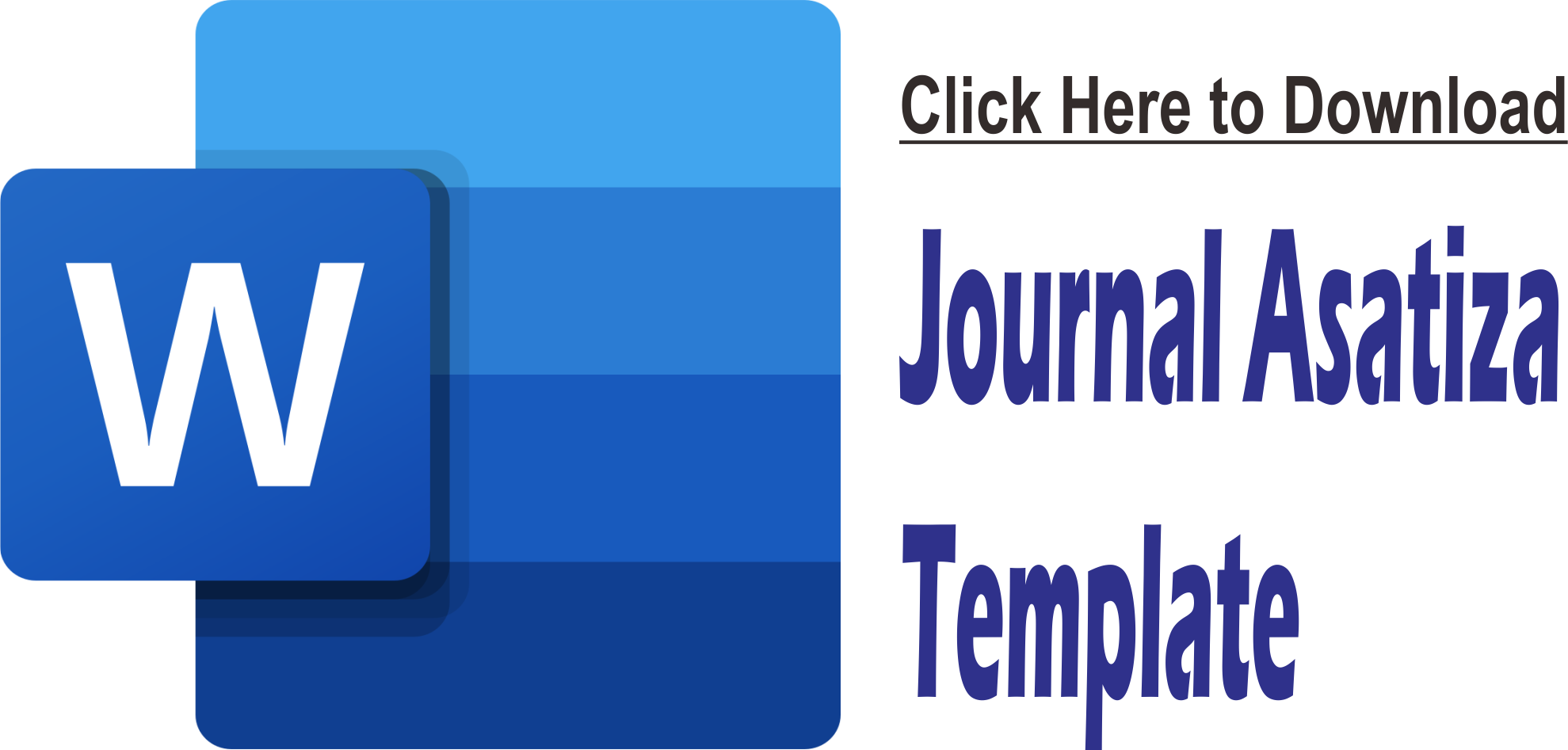From motivation to practice: A qualitative study of university students’ strategies and expectations in Indonesia’s teaching campus program for elementary schools
DOI:
https://doi.org/10.46963/asatiza.v6i2.2443Keywords:
Expectations, Motivation, Planning, Teaching Campus ProgramAbstract
The Teaching Campus Program (TCP), a strategic initiative under Indonesia’s Merdeka Belajar (Emancipated Learning) policy, aims to enhance students’ pedagogical skills while supporting educational equity by placing university students in under-resourced schools. This study explores TCP students’ motivations, implementation plans, and expectations. The method employed in this study was a qualitative design. Using qualitative data gathered from semi-structured interviews with six students drawing on purposive sampling, the study applied three-step analysis model: data condensation, data display, and conclusion drawing. The findings revealed strong motivations in enhancing educational quality in Indonesia through their planning on some innovative methods such as gamification for promoting literacy and numeracy activities. In addition, they expected to enhance student engagement and school performance. To ensure the sustainability of the program, it is recommended that TCP initiatives be institutionalized through strategic partnerships between universities and schools, and supported by national education policies that integrate TCP into teacher training frameworks and school improvement agendas.
Downloads
References
Akmalina, S. M., & Prastyo, Y. D. (2023). Students’ perceptions and motivation on the implementation of MBKM at English department of Universitas Bandar Lampung. Journal of Education, Linguistics, Literature and Language Teaching, 6(01), 1–17. https://ejurnalunsam.id/index.php/ELLITE/article/view/7647
Alhusni, Q., Yudha, C. B., & Oktaviana, E. (2023). Sustainability Analysis of campus teaching program batch 3 for elementary school students. Proceeding of International Conference on Education, 2, 63–72. http://ice.stkipkusumanegara.ac.id/index.php/proceeding-ice/article/view/482
Anderson, E., & Lee, Y. (2015). Integrating interprofessional service-learning into teacher education programs: Preparing the next generation of teachers. New Waves-Educational Research and Development Journal, 18(1), 1–17. https://files.eric.ed.gov/fulltext/EJ1211399.pdf
Apoko, T. W., Handayani, I., Hanif, I. F., & Hendriana, B. (2023). An evaluation of the implementation of emancipated learning program policy in University of Muhammadiyah Prof. Dr. Hamka. Jurnal Paedagogy, 10(2), 431. https://doi.org/10.33394/jp.v10i2.6753
Apoko, T. W., Pratama, S., Simatupang, J., Febita, A., & Pratama, A. (2025). The efficacy of teaching campus program in promoting primary school students’ literacy skills. Journal of Education and Teaching (JET), 6(2), 446–461. https://doi.org/10.51454/jet.v6i2.520
Burns, A. (2009). Doing action research in English language teaching: A guide for practitioners. Routledge.
Cohen, L., Manion, L., & Morrison, K. (2018). Research Methods in Education. In Routledge (8th ed.). Routledge.
Creswell, J. W., & Creswell, J. D. (2018). Research Design: Qualitative, Quantitative, and Mixed Methods Approaches. Sage, Los Angeles.
Hidayat, S., & Patmisari. (2023). An analysis of understanding teacher profesional competence: Students participation in kampus mengajar program and teaching experiences. In International Conference on Learning and Advanced Education (ICOLAE 2022) (pp. 2201–2215). Atlantis Press. https://doi.org/10.2991/978-2-38476-086-2_177
Indriani, F. I., & Holisah, H. (2022). Evaluation of the implementation of the teaching campus program in elementary school: A phenomenological approach. Jurnal Penelitian Dan Evaluasi Pendidikan, 26(2), 137–159. https://doi.org/10.21831/pep.v26i2.46834
Ismail, R., Slamat, T. A. H., & Wabula, V. (2024). The impact of kampus mengajar program on teaching and learning. HUELE: Journal of Applied Linguistics, Literature and Culture, 4(1), 13–26. https://doi.org/10.30598/huele.v4.i1.p13-26
Jamilah, Astuti, Y. P., & AR, M. M. (2023). Implementation of the campus teaching program batch 3 in building scientific literacy in elementary schools. Jurnal Penelitian Pendidikan IPA, 9(7), 5140–5149. https://doi.org/10.29303/jppipa.v9i7.4049
Kajfez, R. L., & Matusovich, H. M. (2017). Competence, autonomy, and relatedness as motivators of graduate teaching assistants. Journal of Engineering Education, 106(2), 245–272. https://doi.org/10.1002/jee.20167
Kolb, D. A. (2014). Experiential Learning: Experience as the Source of Learning and Development. FT Press.
Liu, D. (2022). The factors of enhancing Graduate Teaching Assistants’ Technological Pedagogical Content Knowledge (TPACK) performance in engineering curriculum teaching. Discover Education, 1(1), 17. https://doi.org/10.1007/s44217-022-00017-8
Miles, M. B., Huberman, A. M., & Saldana, J. (2014). Qualitative Data Analysis: A Methods Sourcebook. In Practitioner Research and Professional Development in Education (3rd ed.). https://doi.org/10.4135/9780857024510.d49
Oktapiani, M., Sutiono, S., & Choli, I. (2022). Evaluation of the implementation of the kampus mengajar program based on the CIPP model. Ta’dib: Jurnal Pendidikan Islam, 27(2), 132–145. https://doi.org/10.19109/td.v27i2.14644
Rahman, A. A. (2019). Decentralised education policy in Indonesia: intended outcomes and remaining challenges for teachers. Exchanges: The Interdisciplinary Research Journal, 6(2), 30–47. https://doi.org/10.31273/eirj.v6i2.240
Ramadansur, R., Bastian, A., Rizky, R., Sembiring, A. K., Herdi, H., & Derin, T. (2024). A solution with its own problems : analysing the problems encountered by the “kampus mengajar” program. Jurnal Kependidikan: Jurnal Hasil Penelitian dan Kajian Kepustakaan di Bidang Pendidikan, Pengajaran dan Pembelajaran, 10(1), 275. https://doi.org/10.33394/jk.v10i1.8839
Ramdani, R., Agustan, A., & Darmuh, M. M. (2023). Analysis of program development, benefits, and challenges of implementing “kampus mengajar” in improving teaching skills of Muhammadiyah Makassar University Students. Journal La Edusci, 3(5), 167–173. https://doi.org/10.37899/journallaedusci.v3i5.774
Rodgers, K. J., Marbouti, F., Shafaat, A., Jung, H., & Diefes-Dux, H. A. (2014). Influence of teaching assistants’ motivation on student learning. 2014 IEEE Frontiers in Education Conference (FIE) Proceedings, 1–8. https://doi.org/10.1109/FIE.2014.7044004
Sinaga, N. T., Purba, R. A., & Pakpahan, C. (2023). The impact of kampus mengajar program on student literacy culture in elementary school 104296 Sei Belutu. Journal Of Education And Teaching Learning (JETL), 5(2), 1–12. https://doi.org/10.51178/jetl.v5i2.1300
Suardi, S., & Nur, S. (2022). Strengthening character in the teaching campus program at the Jaya Negara elementary school, city of Makassar. JED (Jurnal Etika Demokrasi), 7(1), 28–37. https://doi.org/10.26618/jed.v7i1.6554
Sumani, S., Kadafi, A., Purnomosasi, L. K. D., & Prasasti, P. A. T. (2022). The impact of “kampus mengajar mbkm” on students’ social skills. Pegem Journal of Education and Instruction, 12(3), 220–225. https://doi.org/10.47750/pegegog.12.03.23
Suyatno, S., Wantini, W., Pambudi, D. I., Muqowim, M., Tinus, A., & Patimah, L. (2023). Developing pre-service teachers’ professionalism by sharing and receiving experiences in the kampus mengajar program. Education Sciences, 13(2), 143. https://doi.org/10.3390/educsci13020143
Tampubolon, S., & Simamora, S. (2023). The campus teaching program batch 4 at YP Utama Junior High School Medan Tembung. Journal on Education, 5(3), 6073–6081. https://doi.org/10.31004/joe.v5i3.1373
Wahyuni, R. T., & Saleh, M. N. I. (2023). University students’ experiences on readiness and understanding in impelementing the program of kampus mengajar. Edukasi: Jurnal Pendidikan, 21(2), 213–227. https://doi.org/10.31571/edukasi.v21i2.5912
Widia, W., Agus, T., & Yulfi, Y. (2024). Perception of teaching skills development through kampus mengajar program by English education study program students of PGRI Silampari University. Sintaksis : Publikasi Para Ahli Bahasa dan Sastra Inggris, 2(4), 284–296. https://doi.org/10.61132/sintaksis.v2i4.921
Downloads
Published
Issue
Section
License
Copyright (c) 2025 Tri Wintolo Apoko, Yusnawati Yusnawati

This work is licensed under a Creative Commons Attribution-ShareAlike 4.0 International License.
Authors who publish with this journal agree to the following terms:
1. Copyright on any article is retained by the author(s).
2. The author grants the journal, right of first publication with the work simultaneously licensed under a Creative Commons Attribution shareAlike 4.0 International License that allows others to share the work with an acknowledgment of the work’s authorship and initial publication in this journal.
3. Authors are able to enter into separate, additional contractual arrangements for the non-exclusive distribution of the journal’s published version of the work (e.g., post it to an institutional repository or publish it in a book), with an acknowledgment of its initial publication in this journal.
4. Authors are permitted and encouraged to post their work online (e.g., in institutional repositories or on their website) prior to and during the submission process, as it can lead to productive exchanges, as well as earlier and greater citation of published work.
5. The article and any associated published material is distributed under the Creative Commons Attribution-ShareAlike 4.0 International License











2.png)



